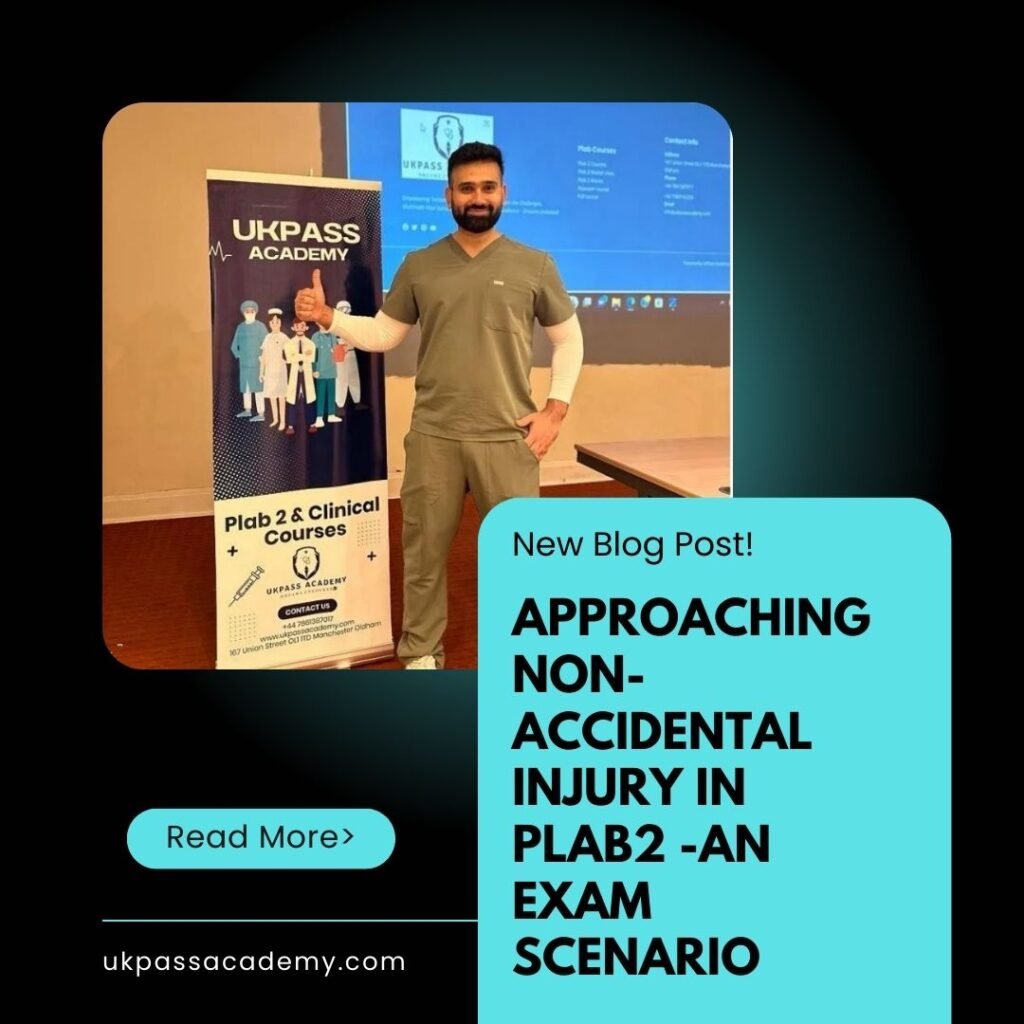Hello everyone, I’m Dr. Zeeshan, and today we’re going to delve into a PLAB-2 exam scenario focused on handling suspicions of non-accidental injury in pediatric cases. This scenario is crucial for understanding how to manage sensitive situations involving child welfare and clinical investigation.
Introduction to the Scenario
In this scenario, Dr. Zeeshan, a colleague in the pediatric department, speaks with Erica, who is the grandmother of Daniel, a four-month-old baby. Erica brought Daniel to the hospital after noticing unusual swelling in his arm while changing his nappy. Here’s how Dr. Zeeshan begins the conversation and gathers information:
Gathering Background Information
Dr. Zeeshan starts by confirming Erica’s relationship to Daniel and asking for details about what led her to bring him to the hospital. Erica explains that she noticed the arm swelling when she returned home after a night shift. She and her partner have been caring for Daniel while their daughter is on a short break. Dr. Zeeshan explores further, asking about Daniel’s usual health, any previous medical issues, and his developmental milestones.
Investigating the Injury
Upon conducting an X-ray, the medical team confirms a fracture in Daniel’s arm. Dr. Zeeshan discusses with Erica that the nature of the fracture suggests it wasn’t accidental, prompting concern about possible non-accidental injury (NAI).
Addressing Concerns and Next Steps
Dr. Zeeshan informs Erica about the need for further tests to understand how the injury occurred and ensure Daniel’s safety. She emphasizes the involvement of social services due to suspicions of NAI, which requires Erica to contact her daughter and possibly her partner for additional information.
Erica expresses worry and confusion about the situation. Dr. Zeeshan assures her that the hospital team will support Daniel’s comfort and well-being while the investigation progresses. She advises Erica to speak openly with her daughter and partner, encouraging them to provide any relevant details that could shed light on what happened to Daniel.
Providing Support and Care
Throughout the conversation, Dr. Zeeshan maintains a compassionate approach, explaining medical procedures clearly and addressing Erica’s concerns with empathy. She ensures Erica understands the importance of collaboration with social services and medical professionals to safeguard Daniel’s welfare.
Dr. Zeeshan also discusses pain management strategies for Daniel and offers Erica the opportunity to visit him under supervision to provide reassurance. This gesture underscores the hospital’s commitment to patient care and family support during challenging times.
Conclusion
In PLAB-2 exams, scenarios like these assess a candidate’s ability to handle delicate situations involving child safeguarding, clinical decision-making, and effective communication with family members. Understanding how to navigate suspicions of non-accidental injury while maintaining empathy and professionalism is crucial for passing the PLAB-2 exam and for real-life medical practice.
Why PLAB 2 Course Matters
Preparation for PLAB 2 exams at UKPASS Academy equips medical professionals with essential skills to excel in scenarios like the one discussed. The academy offers comprehensive courses designed to simulate real-world medical challenges, ensuring candidates are well-prepared for clinical assessments.
Key Skills Learned in PLAB 2 Course
- Clinical Reasoning: Candidates learn to analyze symptoms, conduct examinations, and interpret diagnostic results to formulate accurate diagnoses and treatment plans.
- Communication Skills: Effective communication with patients and their families is emphasized, including delivering difficult news and ensuring understanding of medical procedures and recommendations.
- Ethical and Legal Considerations: Understanding the legal obligations and ethical responsibilities in healthcare settings, particularly in cases involving child protection and non-accidental injury.
Benefits of Enrolling in PLAB 2 Course
- Expert Guidance: Led by experienced instructors, the course provides insights and strategies based on real-world medical practice scenarios.
- Mock Exams: Practice exams simulate PLAB 2 scenarios, helping candidates refine their approach and build confidence.
- Comprehensive Resources: Access to study materials, case studies, and interactive sessions enhances learning and retention of critical concepts.
Real-World Application
The skills gained through PLAB 2 training at UKPASS Academy are not only essential for passing exams but also for delivering compassionate, competent care in clinical settings. Medical professionals who undergo this training are better equipped to handle complex cases, such as suspected non-accidental injuries in pediatric patients, with sensitivity and professionalism.
Conclusion
Thank you for exploring this PLAB-2 exam scenario with me. Understanding how to approach cases involving child welfare issues is vital for aspiring doctors preparing for their PLAB 2 exams. At UKPASS Academy, we are committed to providing comprehensive training that prepares candidates to excel in their exams and excel in their medical careers.
If you have any questions about PLAB 2 preparation or would like to know more about our courses, please visit UKPASS Academy or leave a comment below. Stay tuned for more insights and scenarios to enhance your medical knowledge and skills.

